«Michael was the first artist who jumped into the canvas and became a part of it, where every moment of life is part of the show. Who else can live like this, dammit?»
(Eddie Murphy, actor)
There are no better words, but just this one statement by Eddie Murphy to describe the life of Michael Jackson. In truth, all his life was one great show, his show. Some like to see his life as a mission sent from above, some discuss the drama of the extremely gifted man, the establishment of a musical genius and successful entertainment business. But numerous stories from his colleagues and statements of Michael himself say just one thing – he simply wanted to be great, always. His genius and success is a man-made phenomenon.
Michael was a person of limitless ambitions, courage, immense energy and commitment. He was possessed by his aim – to become the most successful performer of all times.
And he succeeded.
NO MORE “AFRO”
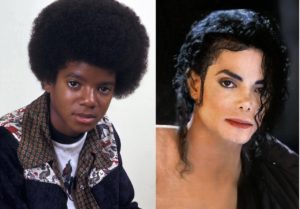 Few ponder over how he managed it and what it took. All conversations about an inborn gift are not an answer to that question. The main secret of his success is maniacal obsession with his work. Even in his childhood, when his brothers, also music band members, tried to postpone the rehearsal by playing baseball, Michael was the one who forced his older brothers to stop acting the goat and start working. When he became an adult and took his career in his own hands, there was no way to stop him.
Few ponder over how he managed it and what it took. All conversations about an inborn gift are not an answer to that question. The main secret of his success is maniacal obsession with his work. Even in his childhood, when his brothers, also music band members, tried to postpone the rehearsal by playing baseball, Michael was the one who forced his older brothers to stop acting the goat and start working. When he became an adult and took his career in his own hands, there was no way to stop him.
He used himself, his body, his face and voice as materials to create a fantastic personality, a supernatural creature born to entertain and amuse. Michael created himself in whole, never missing a detail, either a haircut, a dance step, a voice tone or his manner of conversation – like a thoughtful sculptor creating a work of art. And don’t let the fact that Michael always played a role fool you – he always was in character because his image was what was natural and most comfortable for him.
“I was always happier on stage than off.” (Michael Jackson)
“At age nineteen, he had the wisdom of a sixty-year-old and the enthusiasm of a child. He was a genuinely shy, handsome kid who hid his amazing intelligence with small smiles and giggles. But beneath that shy exterior was an artist with a burning desire for perfection and an unlimited ambition to be the biggest entertainer in the world.” (Quincy Jones, producer).
Coming of age, Michael started changing his appearance. He didn’t want Michael Jackson the solo performer to be associated with a cute boy from the Jackson 5. He wanted to be as war away from the “sweet little boy with an Afro” image as possible, he wanted to have his own style, so that nobody would dare look back and say that he owed everything to his brothers and family. At 21, there was no more Afro hair.
“MJ will be my new name. No more Michael Jackson. I want a whole new character, a whole new look. I should be a totally different person. People should never think of me as the kid who sang ABC or I Want You Back. I should be a new, incredible actor/singer/dancer that will shock the world. Iwilldonointerviews. Iwillbemagic. I will be a perfectionist, a researcher, a trainer, a masterer. I will be better than every great actor roped into one. I must have the most incredible training system. To dig and dig and dig until I find.
I will study and look back on the whole world of entertainment and perfect it, take it steps further from where the greats left off.” (Michael Jackson, 1979 (at the age of 21).
THRILLING AMBITIONS
At 25, Michael released the most successful album in the history of music records, thus fulfilling one of the clauses of his memorandum which he had composed two years earlier. But his success was not only due to his music. Michael learned too early that it was not enough to be just a good musician to have success and glory.
When receiving his eight Grammy Awards for “Thriller”, he always got onstage wearing sunglasses. Some thought that might be arrogance, famous performers watched with puzzled faces how a thin young man ran past them, his outfit a mass of sparkles, to get yet another award. “Okay, Katharine Hepburn who is a dear friend of mine told me I should, and I’m doing it for her, and the girls in the balcony,” Michael said taking off his glasses and listening to the girls screaming wildly in the audience. Eight Grammies for one album – this was a record, it was memorable, but the episode with glasses was memorable as well. These are the tiny things which create a legend.
After seriously going solo, Michael didn’t want to perform with his brothers any more. That’s why, when he received an offer to perform with them at the Motown 25 celebration, he refused. But then he set his own terms, “Okay, I will perform, but I want to sing a solo piece”. During the performance, after a short Jackson 5 medley, his brothers left the stage, leaving Michael on his own. “Thosewerethegoodolddays. Those were good songs, I like those songs a lot… but especially I like… the new songs,” Michael said just seconds before the intro beat of Billie Jean kicked off. And two minutes later the world saw the moonwalk for the first time, which has become his signature dance step.
Michael never spared himself to reach his goals. Everything he could think of at that time were the new songs, new dance steps, new costumes and attributes of his new image. He was never seen at clubs or parties. Being 25 years old, he spent all of his time working.
Michael created a retro-style image, inspired by musicals of the 50-ies and the 60-ies, but he added contemporary elements, such as leather jackets and shiny buckles. The contrast is the main thing of Michael Jackson’s image. He never felt embarrassed about experimenting. The world of his fantasies was limitless, but what’s more important – he had enough audacity to bring his ideas into life.
Humble and modest in personal communication, treating anyone he saw with the greatest respect – be it a cleaning lady in a hotel or a record company director, Michael was strict and prudent in business. He realized the scale of his talent and he knew how to use it, but his aims always were much higher and larger than what he had already achieved.
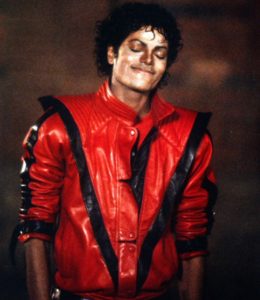 The society makes us think that pride is a sin. Michael, despite talking about his religiousness a lot, has never been shy of this sin. In his house, he had a Michael Jackson museum although he slept on a mattress thrown on the floor and wore the same pair of shoes for years. He often videotaped himself for his home video archive, as of trying to preserve the process of creating of a performer invented and developed by him with so much diligence.
The society makes us think that pride is a sin. Michael, despite talking about his religiousness a lot, has never been shy of this sin. In his house, he had a Michael Jackson museum although he slept on a mattress thrown on the floor and wore the same pair of shoes for years. He often videotaped himself for his home video archive, as of trying to preserve the process of creating of a performer invented and developed by him with so much diligence.
In one of such records, Michael asks his elder sister LaToya what she would like to do and what to achieve, and she says that she would, naturally, want to be as successful as her brother Michael (meaning the success of “Thriller”). It looks as if her response makes Michael shy, he casts his eyes down and smiles, “But I haven’t done anything special…” LaToya is busy talking and complimenting his achievements, and Michael’s words almost drown in her talk. He continued, “… I have just started.”
THE MAKING OF MJ
Michael worked out everything. He started with self-education, outlining the main subjects which would help him in his profession. He read books on psychology, art history, music history, poetry, fairytales and myths, biographies of outstanding persons and ancient philosophy. He was very well-read, and his siblings considered him a smarty-pants and a swank. But the performer he created had to be perfect in all aspects – black working class origin, no education and bad manners which were far from the behavior norms in higher society didn’t matter. If you want to conquer the world, learn to match the elite.
Michael studied successful performers of the past and watched the old musicals. He kept researching, determining all the aspects which would work for the public the best. Mystery is one of them. People should wonder what you’re like in everyday life – the less they know about your personal life, the better it works for your popularity.
In the middle of the 80-ies, Michael hired a personal makeup artist (Karen Faye) and personal costume designers (Dennis Tompkins and Michael Bush). These people helped Michael create an imperishable image of a superstar. But the main work regarding his image was done by him alone. He drew pictures of his outfits, placing accents wherever he wanted them. He added unusual elements, be it an armband, white tape on his fingers, a fedora hat or curls falling onto his forehead. There were no extremities which would fall out of place – just what would attract the public attention and raise yet another wave of curiosity.
What’s the tape for? In a private conversation with a colleague, Michael answered sincerely, “To make everyone wonder.”
“Like his music, dressing Michael Jackson was an exercise in layering, purposeful yet free. In the background of his songs, Michael sampled unique and unconnected elements that when combined just happened to make it all come together. The controlled chaos was part of Michael’s mystique. Emulating Michael’s music meant being multifaceted in our designs. We had to be balanced while maintaining flow; garnisned, but not gauche. Not only did we have badges, we had buckles, zippers, studs and rhinestones. Michael didn’t accessorize, he embellished. “What you can’t wear, I will carry,” was one of his sayings. And just as with his music, he wanted us to push his wardrobe right to the edge (…) Michael’s synergy of music and style was part of his genius.” (Michael Bush, Jackson’s dresser).
MYSTERY
“The power of mystery, it’s very powerful, it’s spiritual. People conjure up all these ideas, people create it themselves, they conjure up all the ideas in their heads about what’s going on. I mean, they used to say, you know, Howard Hughes is up there and he owns the hotel, but he stays on that floor, he doesn’t come down. He’s in the dark, he’s in the corner in the bed with long nails and hair down to here, and he’s hooked to an IV. So the brain would just go crazy conjuring up all kinds of crazy stories, and I love that. I love Howard Hughes ‘cause he played this big thing. I mean, to me, he’s like one of my masters. But I don’t know this is the first time I’ve ever said this, I love Howard, he’s a genius. [Because he knew] how to play people. He knew how to make the public interested.” (Michael Jackson)
In the beginning of the 80-ies, Michael went into seclusion, stopped giving interviews and practically never went public, unless it was necessary for his stage performances. No information about his private life, no public statements about love, nothing. No groveling before the media, no flirting with the music get-togethers. Michael never squandered his talents on trifles, he never played a clown on television, like many performers who were invited to host music awards ceremonies.
“I always talk about deer and dogs and cats. A lot of people go, “There’s a deer!”, ‘cause they’re shy, they’re always hidden. It’s a big deal to see a deer, I mean, and I appreciate that, how people should appreciate real ability and I always say I don’t care if you’re the most talented person in the world, if you come on the television everyday, people will regurgitate you. You have to know how to play your audience…
You can say to somebody, “There’s six doors, you can open any of those doors. Butthefifthdoor, don’topenit. Don’topenthefifthdoor, nomatterwhat.” Of course, everyone is going, “What’s behind door number five?” because it’s a great mystery. And that’s it, everyone wants to expose door number five. And I love that and it’s not like a game, but I want people to appreciate talent and ability.” (Michael Jackson)
Michael Jackson wanted to become a riddle – and he did. It seemed that people stopped believing he was human, made of flesh and blood. Anything he did was doubted, starting from growing a natural beard and ending with sex with women. Any of his deeds would be noticed and discussed widely.
“They said that I had each little hair on my face implanted with a laser, lasered in. Howignorantisthat? I can’t even grow a beard now?” (Michael in “Living with Michael Jackson”, 2001).
Jackson was a top class strategist, knowing how to calculate each of his moves, and he knew exactly how to manipulate the audience. When lots of people who knew him personally say he was “a skillful manipulator”, this sounds like a compliment.
SCULPTOR
A professional to the bone, a perfectionist. Not many can understand and feel that a performer has to take care of everything. There were no minor things for Michael. If he didn’t like his figure, he’d start worrying – he would put himself on a strict diet to get rid of extra kilos, and spent twice as much time in the dancing room. “I want a perfect dancer body.” A figure to be used not as a means of seduction of women, but a dancer’s body. To make the dance perfect, you need a perfect instrument – a perfect body.
“I brought a pair of five-pound dumbbells when we first started working together this time. But Michael didn’t want to use them, because he said he didn’t want to get big and muscular! He said, “Lou, I don’t want to put on a lot of muscle!” I love Michael, but I couldn’t help but laugh at that. Like you can put on muscle with five-pound weighs! But he still said no.” (Lou Ferrigno, fitness coach)
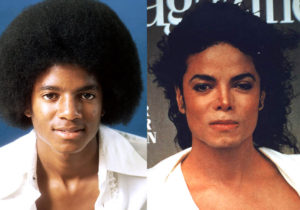 Could just an ordinary-looking African-American guy become mega-popular across the world, even if he had good artistic base? Despite all the political correctness of the American society, it was practically impossible, neither in the 80s, nor today. If Michael Jackson stopped at the version of his image of the beginning of the 80s, the world would not acknowledge him, would never notice him among hundreds of cute talented black performers.
Could just an ordinary-looking African-American guy become mega-popular across the world, even if he had good artistic base? Despite all the political correctness of the American society, it was practically impossible, neither in the 80s, nor today. If Michael Jackson stopped at the version of his image of the beginning of the 80s, the world would not acknowledge him, would never notice him among hundreds of cute talented black performers.
If you can change the shape of your body to become a better dancer, if you can put on a suit and have a make-up to outline your image, why can’t you change your face? Michael treated his face just like he treated his outfits – it was also an element necessary for successful work.
“I’m a performer. I might wanna put a red dot right there one day *points to his forehead*, and two eyes right here *touches his cheeks*” (Michael Jackson, Prime Time Live interview, 1995, being sarcastic about his appearance).
No sentimentality – it seems as if he got rid of his acquisitive attitude to his face and started carving on it something which would, on his opinion, work better for him.
“Michael had permanent makeup, I would only need to touch it up a little sometimes, and sometimes he did it himself.” (KarenFaye, makeupartist)
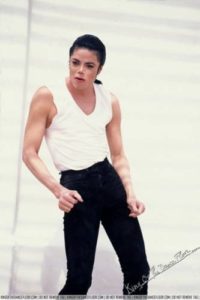 Plastic surgeries? Feminine look? Make-up? Who cares that you don’t look like others? You’re a performer, and to be unlike others is your job. If people pay attention to you, if they can’t take their eyes off you, it means you’ve done a great job, it’s working. The face is a canvas on which you can paint anything you want if you have a goal that’s worth it.
Plastic surgeries? Feminine look? Make-up? Who cares that you don’t look like others? You’re a performer, and to be unlike others is your job. If people pay attention to you, if they can’t take their eyes off you, it means you’ve done a great job, it’s working. The face is a canvas on which you can paint anything you want if you have a goal that’s worth it.
“One of the things he always told me was, don’t be afraid to be different. In other words, when you have that desire, that drive, people are going to try to pull you away from that, and pull you closer to the pack to be ‘normal.’ And he was saying, It’s O.K. to be that driven; it’s O.K. to be obsessed with what you want to do. That’s perfectly fine. Don’t be afraid to not deviate from that.” (Kobe Bryant, basket ballplayer).
WORKAHOLIC
Maniacal thoroughness in work made Michael stand out among other performers. In truth, there was no magic, just hard work. But the result is that the audience sees just magic. All the rest stays behind the scenes. The magic wasn’t done by a magic wand, it was achieved with broken bones, years of exhausting rehearsals, raw ligaments and, which is the most important, an ingenious mind of the creator who stood behind all of this.
“When he rehearsed, he’d put all of the clothes, the shirt, the tie, the shoes, the spats, the hat, the jacket, the pants, to see if the movements that he was creating for himself and the ones I created for him felt really comfortable and organic in the clothes he would wear. Michael would stand in front of that mirror just doing the same exact movement, same exact movement for hours and hours, coming back to the same little section, repeating it and repeating it and repeating it.” (Vincent Paterson, choreographer, about working on Smooth Criminal)
There are legends about Michael the workaholic circulating among his sound engineers and producers. Within the 40 years of his professional career, Michael worked with lots of musicians, and all of them speak of scrupulosity of his work as his main feature. One of the sound engineers recalled how Michael would sing scales for two hours before starting his vocal recording session, and how he recorded his vocal parts for the whole song, even the chorus parts which are repeated across the song.
“Prince (singer, musician) would come to the studio in the morning with a song in his head, and he would leave the studio in the evening with a finished record. Michael would come to the studio and make a record, but then we would re-record clapping or finger snaps for 5 days, until we nailed the perfect sound.” (Jimmy Jam, musical producer, arranger)
“He was super vocal. He was so hands on. I’m talking about from the high hat to everything. The sound quality was so important to him. He looked at everything under a microscope, like, «The middle frequency is too much»—he was very technical. He use to always say, «Melody is king» so he really focused in on melody.” (Rodney Jerkins, producer, Vibe interview)
“One morning MJ came in with a new song he had written overnight. We called in a guitar player, and Michael sang every note of every chord to him. «Here’s the first chord first note, second note, third note. Here’s the second chord first note, second note, third note,» etc. We then witnessed him giving the most heartfelt and profound vocal performance, live in the control room through an SM57. Steve Porcaro once told me he witnessed MJ doing that with the string section in the room. Had it all in his head, harmony and everything. Not just little eight bar loop ideas. he would actually sing the entire arrangement into a micro-cassette recorder complete with stops and fills.” (Rob Hoffmann, sound engineer).
To maximize the quality of his singing, Michael hired the best vocal coach. Despite his great experience in music recording, his perfect pitch and his superb vocal base, he believed that his voice needed to be taken care of by a professional. It was important for the job.
“Michael is a high tenor with a range of three and a half octaves. He goes from basso low E up to G and A-flat above high C. A lot of people think it’s falsetto, but it’s not. It’s all connected, which is remarkable. During his vocal exercises he would put his arms up in the air and would start spinning while holding a note. I asked him why he was doing that, and he said, “I may have to do it on stage, so I want to make sure it’s possible.” I’d never seen anything like that before.” (Seth Riggs, vocal coach).
Michael Jackson could not read sheet music, and he always composed his songs in a peculiar manner. He would sing on a tape recorder every instrumental part he heard in his head, imitating the sound of each individual instrument. He was a fruitful composer. Jackson wrote 50 to 60 songs for each of his albums, selecting 10 to 15 tracks for the release.
«Michael had such an amazing energy and such talent. He was always composing new songs and singing them a cappella. One day, he was walking around the house in his pajamas, singing some new pieces that he was working on. He was walking up one set of stairs, and then down another. I asked him, “What are you doing?” He said, “I’m doing two songs at once! I am walking up this set doing one song, and when I walk down the other, I do the other song.” He could write a song in five minutes, it was unbelievable.” (Al Malnik, family friend)
“Once he went on his knees and started playing piano in the barn. He played a few notes then began singing. It was a love song and sounded really good and he had actually written it right there in front of me. It was amazing to watch, it took him about 6 minutes. When he got up, I said, «Did you just write that?» He said, “Yeah, but I have forgotten it already.” (Steve Tarling about Michael in rehab in November 1993)
But even the songs he recorded did not feel perfect for him, so he had difficulty choosing the final version. When he was asked in 2005 what he felt when he listened to Billie Jean (his legendary hit off the “Thriller” album), he said that he still heard everything that should be in the song but wasn’t there.
He had the same attitude to everything he did. After his concerts, getting back to his hotel room and taking a shower, he would watch the videotaped version of the concert he had just played. He watched it and looked for mistakes in the dance, in the poses of his back-up dancers and musicians. Some people go to parties after a concert, some have rest, but Michael never stopped working.
“I’m married to my music, and there has to be that closeness in order to do the kind of work that I want to do.” (Michael Jackson Talks to Oprah Winfrey, 1993)
AUDACITY WITH A CHILD-LIKE FACE
To shock and make the public outraged was also a useful thing for business. But one needs to be creative in scandals and controversies. It wasn’t Michael’s style to pick up a fight in public or appear drunk. His shocking was graceful, like everything he did. In 1991, his short film “Black or White” premiered in the prime time across the national TV. The film consisted of two parts, one including Macaulay Culkin, music, dancing with the Indians and beautiful pictures, and the other…
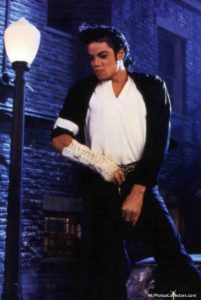 «Then there was the famous scene where Michael morphs from a panther. He’s dancing on top of a car, and all of a sudden he grabs his crotch and starts rubbing himself. I yelled, “Cut!” I said, “Michael, what are you doing?” He said, “I’m expressing myself.” I said, “Michael, that’s weird, don’t do that». He said, “Madonna does it. Prince does it.” I said, “You’re not Madonna or Prince. You’re Mickey Mouse.” So we’re shooting again, and he actually unzips his fly and puts his hand in there. I went, “Cut!” I said, “Mike, I am really not comfortable with you touching your nuts and stroking your cock. I just don’t think it’s acceptable.” And Michael turns to our choreographer, Vince Patterson, and says, “Well, what do you think, Vince?» And Vince says, “I didn’t really like it either.”
«Then there was the famous scene where Michael morphs from a panther. He’s dancing on top of a car, and all of a sudden he grabs his crotch and starts rubbing himself. I yelled, “Cut!” I said, “Michael, what are you doing?” He said, “I’m expressing myself.” I said, “Michael, that’s weird, don’t do that». He said, “Madonna does it. Prince does it.” I said, “You’re not Madonna or Prince. You’re Mickey Mouse.” So we’re shooting again, and he actually unzips his fly and puts his hand in there. I went, “Cut!” I said, “Mike, I am really not comfortable with you touching your nuts and stroking your cock. I just don’t think it’s acceptable.” And Michael turns to our choreographer, Vince Patterson, and says, “Well, what do you think, Vince?» And Vince says, “I didn’t really like it either.”
Michael says, “Well, let’s call Sandy.” At that time, Michael was managed by Sandy Gallin, who also represented Dolly Parton and Cher. Sandy was a screaming queen. A very flamboyant homosexual. Sandy Gallin comes to the set, looks at the playback, and he goes, “Do it, Michael! Do it! Do it!”
The pathos was also good for popularity. A rhinestone-studded glove is nothing, but a 30-foot high statue of himself and the Hungarian army playing extras in his teaser video for the upcoming new album – now, that’s something. Michael was taking it to the edge. Did he understand that he challenged the society and teased the press with each and every of his ambiguous escapades? They say, Michael knew how to joke with a serious face, but he could also be cheeky with an innocent look in his eyes. The image of innocence and “child-like” manners in real life clashed with daring sexuality and aggression in his art.
He became the main source of inspiration for himself. The hysteria surrounding his image, all the rumours and guesswork have stimulated his creative energy. He could turn any episode of his own biography into a successful radiostation hit. Nobody would exploit the King of Pop image better than Michael himself. Anger, love, yearning for his lost childhood, romantic feelings, experience of fatherhood, concerns about the planet, mankind or animals – he could sing and dance all of it.
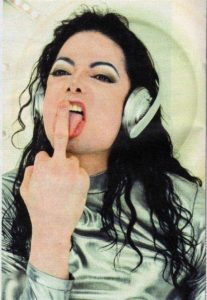 Michael tricked the whole world by manipulating the audiences skillfully. People still can’t come to a single conclusion when commenting his personality. Some say he never used obscene words, others say they heard him swear “like a drunken sailor”, some say he was super shy, and some describe him as a seductive guy with vulgar jokes.
Michael tricked the whole world by manipulating the audiences skillfully. People still can’t come to a single conclusion when commenting his personality. Some say he never used obscene words, others say they heard him swear “like a drunken sailor”, some say he was super shy, and some describe him as a seductive guy with vulgar jokes.
Still, you cannot help but admire the professionalism and devotion he showed to his work. Could the mentality of a child (as many think of Michael) combine with such incredible ambitions?
“People think he’s naïve as a child, but that’s not true, Michael is very cunning.” (Slash, guitar player who worked with Michael)
“You know, Michael doesn’t have such a high voice in regular life. We called it his speaking voice, and it was much lower than the one he used in his songs or during his public performances.” (Bruce Swedien, sound engineer)
There are lots of statements about his “real voice”. But just think: the world has never heard the real voice of Michael Jackson. This high Mickey Mouse-style voice was created by Michael as a part of his image. He easily imitated voices, but when he relaxed and got carried away, those whom he talked to could hear that his voice would change and go lower.
HOW TO CREATE A STAR
We can only guess what was natural in the features of Michael Jackson the superstar and what was created to surprise the public. Is it important? The result is what’s important, and the result has been achieved successfully. Would you like a guide, how to become super popular? This article is a guide. Although we believe you will never be able to use it, because Michael cynically used it for himself, confining the rest of the modern show-business to always be second behind him.
Demonstrating inventiveness, boldness and unique courage to become the one who would be drowned in frenzied jealousy and crazy love, Jackson knew how to create a star. Stars don’t fall from heavens, although the public has to believe that this is where they come from.
“We only live once, since we are given the gift of life. It should be our persistent endeavour to immortalize ourselves. No matter what field of endeavour we choose.” (Michael Jackson)
«Many believed the decision in 1995 to float a 30-foot steel and fiberglass statue of Michael Jackson, sculpted in full neomilitary glory, down the estuaries of many of Europe’s major cities, including London, to promote the HIStory album, to have been an act of monumental hubris. And of course they were right… It is customary, even among enthusiasts of pop, a site familiar with preening narcissists, to deride, even to be offended by such acts of wanton egomania. But then, I’ve always had a penchant for paranoiac demigods with a preternaturally inflated sense of their own omnipotence. Because those kinds of people can make magnificently good art, and even when it’s magnificently bad art, it’s generally more interesting than the norm. The tragedy isn’t that Michael was allowed to indulge his whims in this way, but that he wasn’t allowed to more often.” (Paul Lester, “Michael Jackson’s twenty greatest hits”)
Written by: Karina Kotsinian
Note: Some of the quotes used in the article are provided in shortened form, but they convey the meaning of the quote completely.
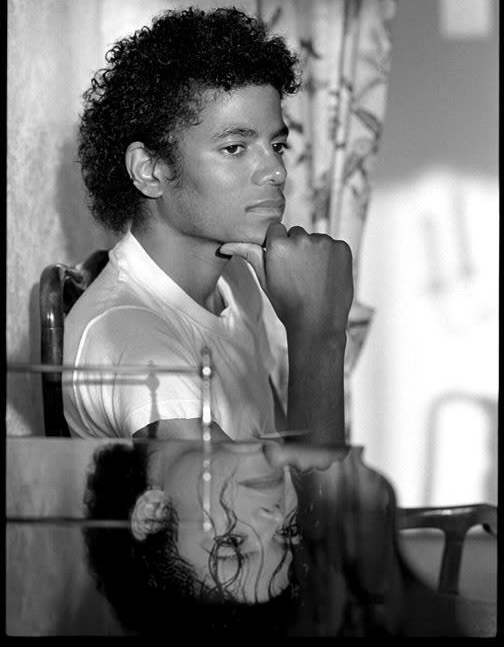
great article…..very inspiring……miss u michael jackson….live forever